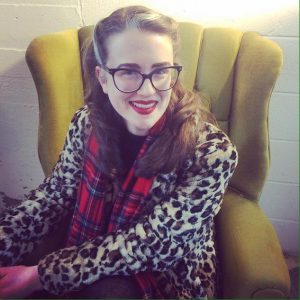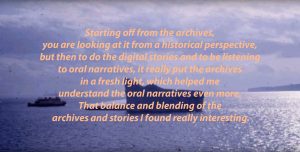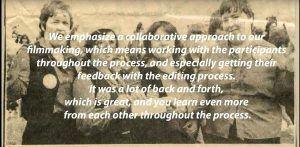 Recently graduated from Memorial University’s Master of Gender Studies program, Lesley Butler is a research assistant with Sharon Roseman working on the production of digital stories for On the Move that help highlight personal histories of employment-related geographical mobility in Newfoundland and Labrador. Last week, Lesley sat down to talk with On the Move about her work and what she’s learned from the project.
Recently graduated from Memorial University’s Master of Gender Studies program, Lesley Butler is a research assistant with Sharon Roseman working on the production of digital stories for On the Move that help highlight personal histories of employment-related geographical mobility in Newfoundland and Labrador. Last week, Lesley sat down to talk with On the Move about her work and what she’s learned from the project.
Can you tell me a little bit about yourself?
I grew up in Torbay and did a B.A. in Anthropology with a minor in Film Studies from Memorial University. I then completed an M.A. at the University of Manchester in Social Anthropology, where I focused on visual and sensory media, which included training in documentary filmmaking. Afterwards I came back to Memorial to do a Masters in Gender Studies and just graduated a few months ago.
Right now I’m working as part of OTM with Sharon Roseman. I started with the GradSWEP Program, which is a work experience program for graduate students, doing mostly archival work with Sharon, as part of the Bell Island ferry commuting project that she is working on.
Was that archival work used in the digital stories?
Yes, my work experience with Sharon started with the archival pieces and then she asked if I was interested in transitioning into the digital stories project, which is what I’m still working on now. That was really exciting. I was able to use what I learned in my masters programs, in terms of the documentary filmmaking and qualitative research skills. It all came together with this project, which was really cool. I was really excited to be a part of it.
What led you to study film and gender?
I’ve always had an interest in film. It started off as a casual interest and when I went to university I took a couple of film studies courses and really started to love film history and film theory. From there I got more into feminist film studies and that introduced me to gender studies, and I thought that was a good fit for me – to do a Masters in Gender Studies – and I could bring it all together. Even my skills from anthropology worked for gender studies because it’s so interdisciplinary, so it seemed like a good fit.
How did you first connect with Sharon?
I met Sharon first in my undergrad, she was my professor in Anthropology. We first met there and she was a great professor, so I was happy to work with her later on as a research assistant.
What have you learned working on the digital stories project?

Where I had two tasks with the archives and the film, and the transition from the archives to the digital stories, I definitely learned a lot. Starting off from the archives, you are looking at it from a historical perspective, but then to do the digital stories and to be listening to oral narratives, it really put the archives in a fresh light, which helped me understand the oral narratives even more. That balance and blending of the archives and stories I found really interesting.
For the digital stories, I assisted with the camera work, sound recording and primarily with the editing, that has been my main task. I love editing. I love taking all the raw footage and putting it all together and finding creative ways to tell a story. Not just using video, but we’ve also used texts, soundscapes, audio recordings, and we used some of the archives that we had to blend it all together.
I’ve learned a lot from Derek Norman. He’s the coordinator of the HSS Film Unit at Memorial. He’s helped a lot with the editing and using the camera. He’s taught me a lot about that and the facilities over there are really great. If I were to do more documentary filmmaking in the future, it’s kind of hard to do on your own, because sometimes access to equipment and editing software can be very expensive, so it’s great to have these facilities to learn from. It’s been fantastic to have that there.
Of course, Sharon as a mentor, is amazing. I mentioned that I had her as a professor in my undergrad and learned a lot from her there. To be able to work with her again, she’s so dedicated and knowledgeable, whether I do more digital stories work or more graduate research or a completely separate field of work, I will definitely take what I learned from her into whatever I do.
Why do you think it’s important to do digital stories as part of OTM’s research?
It’s really important for knowledge mobilization. It offers a way to promote and present the research in a way that is easily available and accessible to the public, more so than an academic journal article, for example.
Why is it called digital stories and not documentaries?

It’s very much like documentary filmmaking, it’s nonfiction for the most part. It’s a particular style of documentary, in a way. Usually they’re shorter videos, about three to five minutes, although the ones we are making now are longer as we are emphasizing interlinked stories through individuals’ lifetimes, so we kind of played with that aspect a little bit. But really digital storytelling emphasizes the fact that everyone has a story to tell, and that you can use various digital tools, such as audio recordings, photography, or text, to do it. So you can really make it your own, even if you don’t have fancy camera equipment or anything like that.
We emphasize a collaborative approach to our filmmaking, which means working with the participants throughout the process, and especially getting their feedback with the editing process. It was a lot of back and forth, which is great, and you learn even more from each other throughout the process. From the archives to the oral narratives, we found there were layers and layers of stories, which was fascinating.
Do you see a future for yourself in documentary filmmaking?
I’m not quite sure what I want to do. Still trying to figure that out but I really do enjoy the digital stories and the filmmaking, especially the editing. I would like to do more in the future, and even if I don’t, if I do archival research more specifically, or more graduate research, I think what I’ve learned here will really help.
If you were to make a documentary what it would be about?
I haven’t quite gotten there, but I have a few ideas of what I’d like to do. Probably a documentary about women in film. I am very interested in autobiography and life narratives. Where my graduate thesis focused on women filmmakers, I would be interested in continuing with that, perhaps with a documentary that highlights the stories of women working behind the camera, and those sometimes forgotten, or hidden, histories of women in film.
To see Lesley and Sharon’s work, check out this video from On the Move https://www.youtube.com/watch?v=ogSOuy_VE_o


Leave a Reply